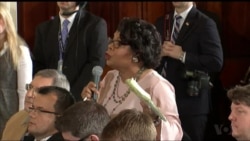When President Donald Trump asked an African-American reporter, April Ryan, during a news conference last month to set up a meeting with the Congressional Black Caucus, the members of the caucus were dismayed by the request, because that is not normally a reporter's role. They said the request fell into old racial stereotypes that the reporter would know them since she is black.
Early tensions
"It shows the president is not really connected to the real world in my estimation," Rep. Gregory Meeks of New York told VOA. "It was somewhat insulting to all the American people for him to ask an individual who's a White House reporter just because she happens to be black."
During his campaign, Trump laid out "a new deal for black America" by promising to cut crime in inner cities, help create jobs for African-Americans, and deal with education challenges.
In a letter to the president January 19, the Congressional Black Caucus says it outlined the issues it considers important. The letter expressed the opinion that his "New Deal for Black America" is ill-informed and insufficient, and it invited him to tap into the decades of expertise held by the CBC to properly address issues that affect African-Americans.
VOA requested comment from the White House but got no response.
After that news conference, most Black Caucus members attended Trump's recent address to Congress.
"Tonight, as we mark the conclusion of our celebration of Black History Month, we are reminded of our nation's path toward civil rights and the work that still remains to be done," Trump said in his opening remarks.
While Meeks considers those words a start, he said there needs to be a more effective policy when it comes to the African-American community.
"African-Americans don't just live in urban America, they live in rural America; they don't just live in suburbia, they live all over the place," he said. "You've got to have a broad policy taking different geographical locations in place. … I happen to represent New York, but there are many members of the CBC who represent rural areas of Mississippi, South Carolina or Georgia."
CBC members
The CBC was established in 1971 and today has a record 49 members. Meeks says that speaks volumes about America's diversity. "America has progressed to the point that African-Americans do not represent just African-Americans or majority African-American districts."
Meeks says the biggest misconception is that the group is monolithic and there's no diversity between ideas.
"You've got members who come from all different perspectives because some are from the East Coast, West Coast; some are from urban areas, rural areas, some believe in hunting and guns, others don't; some believe in trade and some don't; you have new Dems, some progressives and blue dogs [conservative Democrats] that are part of it. So, the CBC is really reflective of America and the regions of America than a lot of people would think."
But politically, the caucus is mainly composed of Democrats, with the exception of Utah Republican Senator Mia Love. Two African-American lawmakers — Senator Tim Scott and Congressman Will Hurd, both Republicans — do not belong to the Black Caucus. The group endorsed Hillary Clinton during the 2016 presidential campaign.
Meeks has been in Congress for 17 years and is a member of the Financial Services and Foreign Affairs committees.
He said Trump should be reaching out to the legislative branch and the CBC, whose members have a wide range of expertise, which could be helpful to any administration.
Rep. Elijah Cummings
Trump recently met with Congressman Elijah Cummings, a CBC member, to discuss efforts to lower prescription drug prices. Cummings, the top Democrat on the Committee on Oversight and Government Reform, says specific questions about the CBC didn't come up during that meeting, but a number of other issues were discussed, including more funding for historically black colleges and universities.
Meeting date set
Trump's office has reached out to the group and a meeting is set for Wednesday. White House spokesman Sean Spicer indicated during a press conference Tuesday that there is no set agenda. But he said a range of issues including drug prices, infrastructure investment and education, HBCUs and health care will be discussed. The willingness to sit down and talk is a first step in the process of a dialogue that needs to continue, Spicer said.










